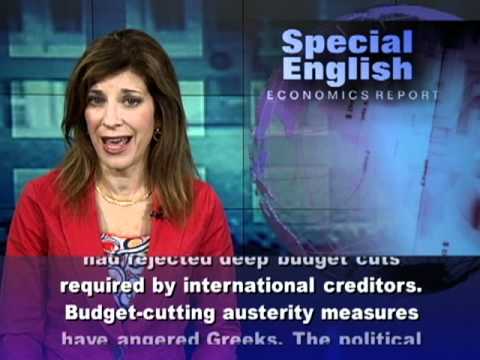Greece and the Euro
 |
This is the VOA Special English Economics Report , from voaspecialenglish.com | facebook.com/voalearningenglish
The Olympic flame was lit in Greece on May tenth. The ceremony marked the beginning of a long trip through Greece and Britain, which holds the Summer Olympics this year. Greece has been at the center of a political and economic struggle that also threatens other European economies. It remains unclear if Greece will continue using the euro, or if its eurozone partners can enact reforms needed to hold the currency group together.On the day the Olympic flame was lit, Greek Socialist leader Evangelos Venizelos began an attempt to form a new government. It marked the third attempt to form a government in the week after parliamentary elections. Mr. Venizelos' PASOK party finished third in the elections. First, the conservative New Democracy party attempted to form a government and failed. Then the leader of the leftist Syriza coalition tried and failed. He said the election results showed the Greek people had rejected deep budget cuts required by international creditors. Budget-cutting austerity measures have angered Greeks. The political situation in Greece raised the possibility of the need for an emergency coalition or even new elections. The political crisis also raised the possibility of punishment by Greece's eurozone creditors. They could deny future payments from the financial rescue plan that they agreed to in February. The agreement is worth about one hundred seventy billion dollars in loans and cancelled debt. The rescue is the second for Greece since its debt crisis began in two thousand nine, and bigger than the first bailout. On May tenth, euro-area governments released a five and a half billion dollar loan to Greece. But Greek officials were said to have been unhappy that over one billion dollars was withheld. The failed efforts to form a government raised concerns that reforms can work in Greece. The country is now in its fifth year of recession. German Chancellor Angela Merkel said borrowing as a way to increase growth would be a step backward. The leader of Europe's biggest economy told her country's parliament: "Growth through structural reform is important and necessary. Growth through debt would throw us back to the beginning of the crisis." For VOA Special English, I'm Carolyn Presutti. To read, listen and learn English with stories about economics and other topics, go to voaspecialenglish.com. You can also follow us on Twitter and Facebook at VOA Learning English.(Adapted from a radio program broadcast 11May2012)
|




